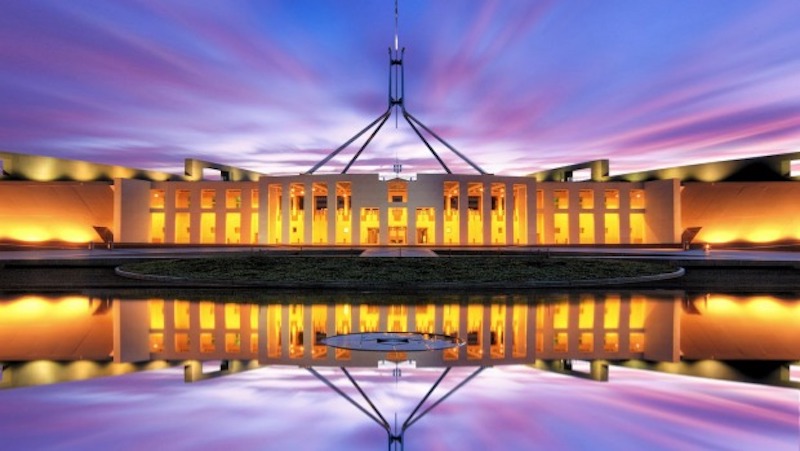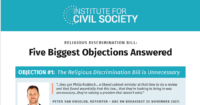Prof. Mark Sneddon, ICS Executive Director, discusses the Galaxy poll on freedom of religion and freedom of conscience, and the importance of these issues for the 2019 Federal Election.
A new poll, conducted by YouGov Galaxy and published by the Institute for Civil Society on Wednesday shows a vast majority of Australians think freedom of conscience and belief needs to be protected. That support is shared across Coalition and ALP supporters and Scott Morrison and Bill Shorten should sit up and take notice.
The Coalition has been slow off the mark and somewhat half-hearted on this issue. It sat on the Ruddock Review into Religious Freedom for months for no good reason and was pushed into releasing it in December through leaks. But at least it has accepted most of the recommendations and agreed to implement them – although it has not taken any legislative action to do so yet.
By contrast, the ALP has made no commitments about any of the Ruddock recommendations except that it will not appoint a Religious Freedom Commissioner to the Human Rights Commission (whereas the LNP will) but will appoint an LGBTI Commissioner. The priorities are obvious.
While the ALP currently says that it supports religious freedom, actions speak louder than words. Both the ALP and the Greens introduced Bills in the Senate last year to cut back the freedom of religious schools and adult colleges and religious bodies under the Sex Discrimination Act. Those Bills would have limited the freedom of those bodies to teach in accordance with their faith and to have faith-based student conduct rules that uphold religious standards.
Under Government amendments to the Bills, religious bodies and colleges would not have been subject to “discrimination” claims for teaching activity which was in good faith in accordance with the doctrines, tenets, beliefs or teachings of a particular religion or creed. The ALP and the Greens refused to support these reasonable protections.
This remains ALP and Greens policy. Both parties have policies to limit the freedoms of religious schools and colleges to select staff on the basis of a person’s religious belief and way of life and to require staff to model that at schools. These policies are all pursued in the name of stopping discrimination. However, little or no corroborated and tested evidence of actual discrimination against students and teachers has been produced.
The key point is that disagreement is not discrimination and the two must not be confused. Some religious and non-religious Australians, who number in the millions, believe sex should be kept within male-female marriage and oppose same-sex marriage. Those Australians are entitled to their views and to educate their children in accordance with their religious and moral beliefs.
To have a different view to others and to express it and teach it is not discrimination. It is the same human right to freedom of speech and belief which other Australians have and exercise when they express the view that religious beliefs and religious believers are wrong.
The Galaxy poll shows that 75% of people agree that freedom of conscience and belief ought to be protected, up from 62% in a similar poll in 2017. Only a tiny 5% stated they disagree, with 20% still undecided. Most concerningly for Shorten, 74% of ALP voters polled said that they supported protecting religious freedom.
The ability for parents to choose a religious education according to their convictions was another thing that the poll shows has widespread support. However, the ALP’s policy to amend the Sex Discrimination Act has the potential to gut the religious education sector and severely limit parental choice in education. This cuts against the wishes of most ALP voters.
The message of this Galaxy poll is that religious freedom is an election issue, despite it seemingly falling off the agenda for both the Coalition and the ALP. Whoever wins government on Saturday won’t just be dealing with franking credits, first home-buyers and climate change. They will also need to ensure that freedom of conscience and belief are protected, in accordance with the wishes of the vast majority of Australians.








Recent Comments